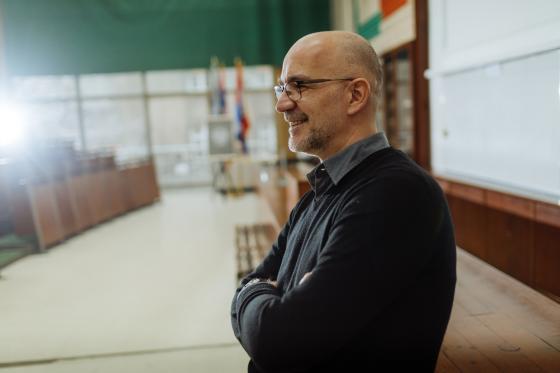Women end up doing the academic housework
While women actively participate in the practical work at their organisation, men dodge it.
The findings of a new study from Danish academia are clear: Men dodge service jobs, leaving them to women.
The findings were so clear that even the researchers were surprised.
“I’ve been interested in gender in working life for many years, but this is the first time I have looked at what happens in my own backyard, at university,” says Nanna Mik-Meyer, professor at Copenhagen Business School.
“I'm not shocked by the results, but I didn't expect the gender patterns to be so obvious,” explains the sociology professor, who wrote the article together with Margaretha Järvinen, professor at the University of Copenhagen.
The researchers conducted 163 interviews with female and male associate professors and professors in the social sciences at three institutions in Denmark. They also obtained their CVs to see whether they reflected such activity.

Men manage to dodge this kind of work
The sociologist emphasises that they were aware there were gender differences, and that most people with experience of academia find that women end up participating more actively in internal service work, e.g. in the administration of seminars, participation in local committees or on various committees.
“I have been in academia for a long time and had registered a pattern, but I was still surprised.”
The interviews revealed that women do most of the internal service work.
“Among female full professors 61 per cent are ’high performers’, but only 27 per cent among the male professors – still high compared with male lecturers,” says Mik-Meyer.
In fact only 11 per cent of the male lecturers are ’high performers’, in comparison 37 per cent of the female lecturers, tells Mik-Meyer.
Mik-Meyer says that the term “relational work” fits well with what the informants told them. The researchers split how the participants’ addressed this issue into four categories: compliance, evasiveness, barter and investment.
“These distinctions enabled us to identify the difference between how men and women participated in service work.”
“This made it clear how men managed to dodge internal tasks, and why women often ended up doing them.”
Investment, or barter and evasiveness
“The goal was to identify how men managed to dodge internal tasks in particular, and why women ended up doing them,” says the professor.
“Can you provide more detail about the four categories, and about how they show gendered relational work?”
“There’s a lot of elements here, but I'll try. When we systematised how relational work was addressed, it became clear that women are governed by compliance to a greater extent than men. Somebody has to do it, so I’ll do it, was the women’s logic. In other words, they do what is expected.”
“Several women also said that they didn’t do it for entirely selfless reasons, but that there was a kind of expectation that their service work was a form of investment, and that it would pay off academically as well.”
The men, says Nanna Mik-Meyer, were far more aware of their choices and navigated whether they benefited their careers. The male associate professors in particular made it clear that they actively engaged in evasiveness and did not want to participate if it was not positive for their careers.
Trade-offs, where it was clear that they wanted a return, were also far more common among male associate professors.
“Why was this the case for the male associate professors, and not the professors?”
“We wondered about that too, and we need to look into that.”
A relatively large group of the male professors, around 25 per cent, participated in service work, and a smaller group of female professors, correspondingly, chose not to do service work, tells Mik-Meyer.
“In this study, we looked at the most dominant pattern, but we clearly need to look at this more closely – i.e. these two deviant groups.”
Women and men equal in terms of external service
The interesting thing is that when the researchers looked at engagement and the relational work associated with external service, such as participating in forums and collaborating with other academic institutions and academics, the pattern changed.
“Suddenly the balance evened out, meaning the men engaged just as much as their female colleagues.”
Mik-Meyer emphasises that some of the external service work was considered career-enhancing:
“As a clear form of barter – that contributing here will mean I get back something that benefits me and my CV.”
“Do the men think more about building CVs than assisting in joint tasks in the workplace?”
“Yes, the findings we have published in the article show that men are better at pursuing individual interests and opt out of the community’s tasks in the organisation.”
“We also compared the interviews with the candidates’ CVs, which also largely confirmed what we were told. Internal service work was rarely noted on people’s resumes, and thus, has little academic value.”
Brazenly describe their own priorities
During the interviews, an interview guide covering a number of topics was followed.
“We were surprised by how brazen and explicit the male researchers were when describing their priorities.”
“Several said that they actively didn’t respond to emails, or acted in an exaggerated disorganised manner. This meant they were assigned fewer tasks, but were also less frequently asked, and thus got away without doing service.”
“What about the women – were they as aware and clear about how they managed service tasks and the consequences of engagement for their own careers?”
“They naturally had different explanations for why they chose to take on such tasks.”
Some women probably thought it strategically and academically smart, some found it difficult to say no, while others said they liked the variation of, for example, organising internal seminars or participating in working groups,” says Mik-Meyer, adding:
“Women in academia are really busy. They are equally committed in both the internal and external service area. And forge a career with credits and publications.”
“Can the findings explain why women have a more complex path to securing an academic position?”
“Yes, absolutely. If, in addition to managing their own careers, they have the main responsibility for service and practicalities in their institution, their opportunities will differ compared with their male colleagues.”

Danish versus Norwegian academic housework
Gry Alsos, Dean of Nord University Business School, has previously used the term “academic housework”.
“Is it equivalent to what the Danish researchers call service work?”
“Yes, it probably is. For me, without research backing when I started using the term, the point was to highlight how important academic housework was and is in keeping institutions running.”
For example, organising seminars, sitting on committees and making expert assessments is essential work for an academic institution, Alsos believes.
The research project shows that male associate professors in particular use relational strategies to dodge internal service work and thus ended up only doing 25 per cent of such work.
“These are findings from three universities in Denmark, do you think the breakdown between women and men is the same in Norway?”
“The gender equality debate in Norway has not been as clear as in Denmark. That means the gap in Norway may be slightly smaller, but we're not that different. Variation will probably occur if we look at different institutions and institutes.”
“Should we use more duties and rules to overcome the biases?”
“In my opinion, this is a system and managerial responsibility. I don’t like the idea of duty as a method. Leaders need to pick candidates for offices, and not let this landscape be based on those who have done it before and make it easy. We all know that more people can be trained to do the tasks.”
"Mik-Meyer and her colleague’s research also shows that service work is not evident in CVs. What do you make of that?”
“I feel that we have a growing awareness of merit. In other words, such work has a greater academic impact than before. In a recruitment process I recently participated in, internal and external ‘internships’ were also seen as decisive, although the research was still the most important factor.”
Reveals patterns
The Danish study by Nanna Mik-Meyer and Margaretha Järvinen was motivated by curiosity about the patterns in academic institutions that make women more likely to take on internal administrative tasks than men.
“We wanted to analyse the underlying processes that lead to women, willingly or unwillingly, ending up performing most of the internal academic services and also the external ones, and, not least, what makes men participate less.”
“You chose a fairly large volume of interviews with 163 associate professors and professors. Is there any particular reason for that?”
“This was far more than we intended, but the number was high given that over 80 per cent agreed to be involved when we first contacted them. That said, we are really pleased with the data, and more articles will follow.”
Next up is an article about networks, says Mik-Meyer.
This news article was updated 12 April 2024.
Margaretha Järvinen, professor at the Department of Sociology, University of Copenhagen and Nanna Mik-Meyer, professor at Copenhagen Business School, recently published the article: Giving and Receiving. Gendered Service Work in Academia (2024).
In the study, Mik-Meyer and Järvinen conducted qualitative interviews with 163 professors and associate professors from three institutions in Denmark.
The topic of the study was who does the academic service work – or the “academic housework”, as many have called it in Norway. This is often work that is not meritorious.




